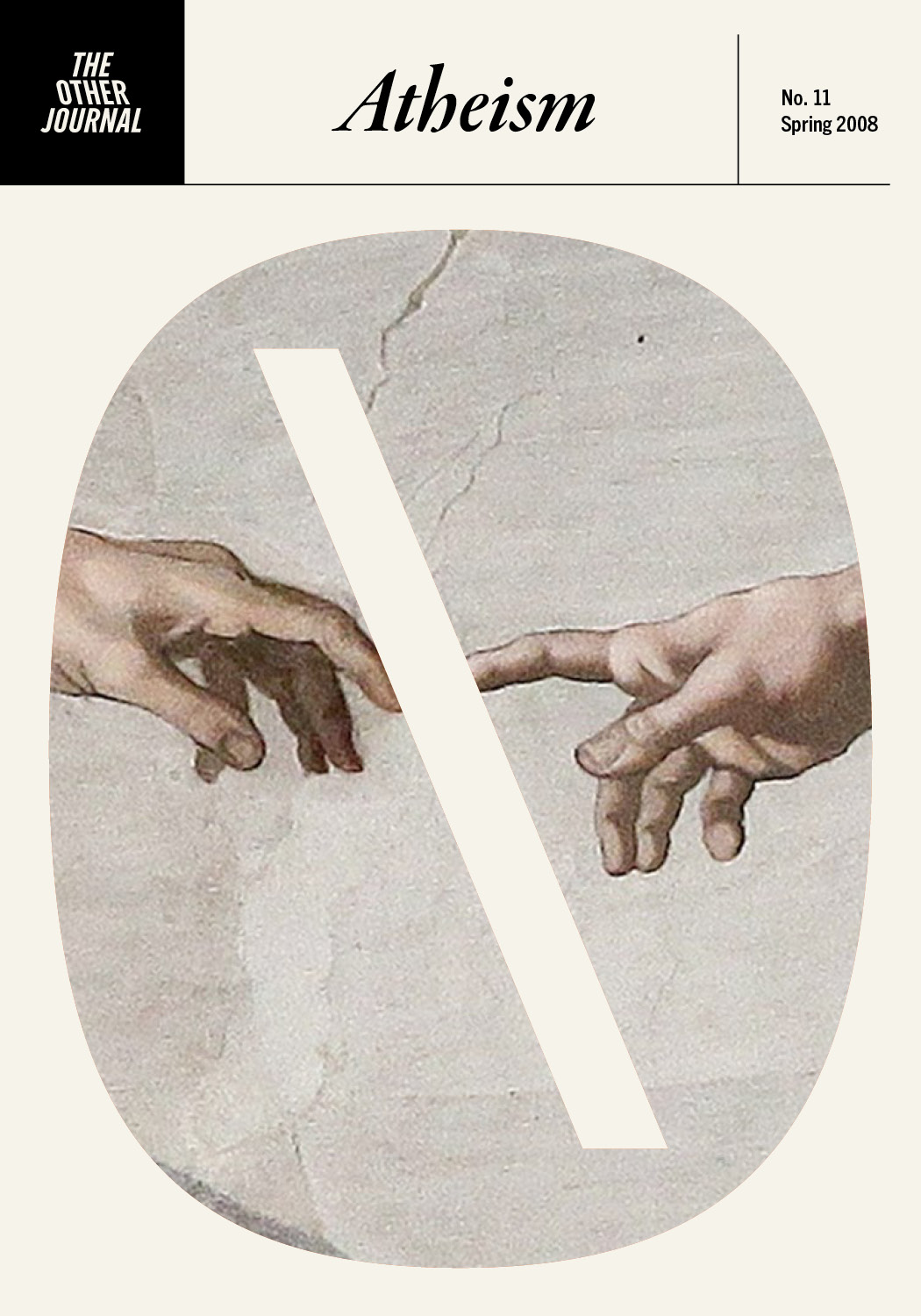Nothing Is As It Seems
A poem by Courtney Druz.

A poem by Courtney Druz.
In this poem, Christopher Mulrooney offers an amusing contrast between belief and disbelief.
In this essay, Ben Suriano responds to Jon Stanley’s claim that there are at least two (very biblical) ways that every Christian would do well to “quite rightly pass for an atheist.” The essay argues that every Christian should rather “quite rightly pass for a Christian” because the predominant form of atheism is in fact the core metaphysical and ontological assumption that makes possible the imperial logics operative in both the Roman and modern order.
In this interview, Charles Mathewes explores the current movements of Atheism through American religious history.
The author explores the work of Hafiz of Shiraz in examining the values of anatheism as an active category in contemporary spirituality.
In this interview, John Milbank discusses his views on modern atheism.
Chris Keller interviews Jim Wallis of Sojourners on his book, The Great Awakening and the current political landscape in the United States.
This article examines the trend of children used as tools and exploitation in world violence and war, and offers hopeful questions for those seeking to make a difference.
In this essay, Becky Crook reflects on the experience of reading The Master and Margarita while dating an atheist.
In this poem by Courtney Druz we are challenged to “grow beyond the brittle carapace” of our selves and “leap like an ibex” from the “crags” of our doubt.
This article reviews the book, “Christian Theology for a Secular Society”
In this essay, Christine Sine explores the Christian reasons for living in community, especially in contrast to atheistic ideologies.
This article examines Christianity’s relationship to immigration in America.
This article reviews Carrie Newcomer’s album, “The Geography of Light.
In this poem, Brandi Gentry uses a recently discovered medieval psalter as poetic bridge to tangling with faith and understanding resurrection.
This review of the book, “Everyday Theology” by Kevin Vanhoozer explores the ideas of cultural change and Christian identity.
In this essay, Jon Stanley looks at the Christian life as transcending the categories of atheism and theism.
In this poem, Luci Shaw metaphorically considers the cycles of collapse and reformation that define the spiritual life.
In this article, Clinton Campbell reviews Robert Brimlow’s candid questioning of the biblical assertions of pacifism in comparison to Just War Theory in his book “What About Hitler?: Wrestling with Jesus’ Call to Nonviolence in an Evil World.”
In this essay, Ronal Kuipers wrestles to answer the deceptively simple question “are you religious” by examining the tradition and the future of faith in our modern world.
This review is a review of Jeremy Begbie’s book, “Resounding Truth.”
In the midst of an election year it seems our allegiances are being torn between the Left and the Right—the left deciding between Clinton and Obama, and the right wondering if McCain is the right man for the job. With every election year comes the promise of hope and the apparently inevitable disappointment that follows […]
In this article Peter M. Candler Jr. reflects on atheism, Christian practice, and classic philosophy.
In this poem, Luci Shaw imagines the life-changing, transformative power of insubordinate ideas.
This article reviews Theology and Culture: A Guide to the Discussion by D. Stephen Long. The book is meant to be a readable introduction to the implications of relating, and discussing the relationship between, theology and culture.
In this essay, Andy Barnes writes about his experience reading Philip Pullman’s “His Dark Materials” trilogy, while visiting the Philippines, and considers Pullman’s descriptions of the atomization of both body and soul, in the context of Manila’s slums.
In this essay, Andy Barnes writes about his experience reading Philip Pullman’s “His Dark Materials” trilogy, while visiting the Philippines, and considers Pullman’s descriptions of the atomization of both body and soul, in the context of Manila’s slums.
In this fable, Larry Gilman considers intellect, faith, divine mystery, and fundamentalism.
Critiquing historical movements of modernity in the western church, Tom Ryan argues in this article that seasons of doubt are equally as important for faith as times of certainty, and are even necessary for fostering a genuine spirituality within the church.
In this poem, Luci Shaw evokes sharp images of winter, mystery, nihilism, and death.
Author Ryan Dueck examines the new atheist movement as a theodicy, building common language between atheists and theists, and offering a critique of some of the more strident atheist voices in contemporary culture.
In this poem, Brad Davis attends to feelings of faith and doubt that swim through tragedy’s aftermath.
In this poem, Brad Davis attends to feelings of faith and doubt that swim through tragedy’s aftermath.
An eclectic selection of works by David JP Hooker.
In this interview, Jeffrey Overstreet discusses his novel “Auralia’s Colors” and examines the way in which artists are compelled to “look closer” at the world, to “discover and reaffirm why things were put that way in the first place.”
In this poem, Jendi Reiter’s narrator seeks new perspective in this “racing-away circumstance.”
This article is a response to Tina Seller’s article, “An Erotic God – A Response to All Sexed Up by Dan Rhodes.”
This article is a response to Tina Seller’s article, “An Erotic God – A Response to All Sexed Up by Dan Rhodes.”
This article highlights the problem of child exploitation internationally and domestically.
In this essay, Fordam University’s Distinguished Professor of Philosophy, Merold Westphal, challenges the reader to examine her soul during the Lenten season through the work of the famous atheists Marx, Nietzsche, and Freud.
Randal Rauser looks at the responses of Christians to the current heightened rhetoric of new atheism in the West.